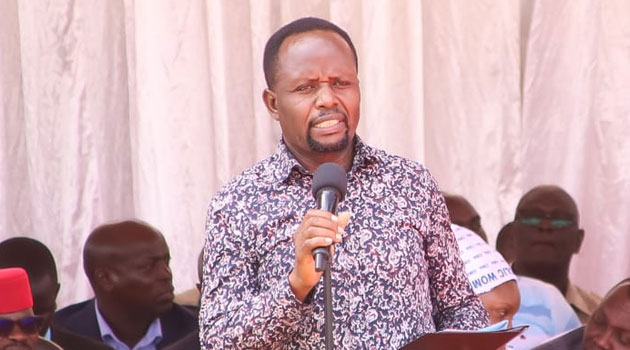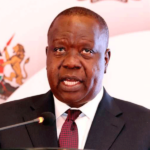George Natembeya, born on February 4, 1971, in Trans-Nzoia County, Kenya, is a prominent figure in Kenyan politics, currently serving as the Governor of Trans-Nzoia County. His journey from a civil servant to a political leader exemplifies resilience, ambition, and a commitment to public service. With a background in anthropology and over 25 years in public administration, Natembeya has made significant contributions to governance, particularly in Western Kenya. However, his tenure has been marked by both transformative initiatives and controversies, including recent corruption charges that have drawn national attention. This article provides a detailed exploration of Natembeya’s education, career, family life, achievements, controversies, and recent developments.
Early Life and Education
George Natembeya was born into the Luhya tribe, one of Kenya’s largest ethnic communities, in Trans-Nzoia County. His early life was grounded in simplicity, with his father working at a local shop and his mother as a homemaker, instilling values of hard work and humility. While specific details about his primary and secondary education are limited, Natembeya pursued higher education at the University of Nairobi, earning a Bachelor’s degree in Anthropology in 1995. He furthered his studies at the same institution, obtaining a Master’s degree in Anthropology in 1999. Additionally, he attended the Kenya School of Government, where he honed his skills in public administration and governance. His academic background in anthropology likely provided a foundation for understanding societal dynamics, which has influenced his approach to leadership and policy-making.
| Educational Milestone | Institution | Details |
|---|---|---|
| Bachelor’s in Anthropology | University of Nairobi | Earned in 1995, focused on human societies and cultures |
| Master’s in Anthropology | University of Nairobi | Completed in 1999, deepened expertise in societal dynamics |
| Public Administration Training | Kenya School of Government | Enhanced skills in governance and leadership |
Career Trajectory
Natembeya’s career spans over 25 years in public service, marked by a series of progressively responsible roles. He began as a Personal Assistant to the late John Michuki, then Minister for Security, gaining invaluable insights into governance and security under a seasoned leader. His early roles included serving as a District Officer and later as District Commissioner in Murang’a, where he played a pivotal role in suppressing the Mungiki gang, a notorious criminal group. His success in this role highlighted his ability to handle complex security challenges.
Natembeya’s career continued to ascend as he served as County Commissioner in Isiolo and Narok, where he tackled issues such as insecurity and environmental conservation, notably protecting the Mau water towers. In June 2019, he was appointed Rift Valley Regional Commissioner, becoming the youngest person to hold this position in Kenya. His tenure was marked by efforts to address banditry and land disputes, though some of his methods sparked controversy.
In January 2022, Natembeya resigned from his role as Regional Commissioner to pursue a political career, a move prompted by the Elections Act requiring public servants to resign before contesting elective positions. He joined the Democratic Action Party of Kenya (DAP-K) and successfully ran for the gubernatorial seat in Trans-Nzoia County during the August 2022 general elections. Assuming office in October 2022, he became the second governor of the county, succeeding Patrick Khaemba. His leadership has focused on transformative governance, with a 70% approval rating according to an InfoTrak survey.
| Position | Duration | Key Responsibilities |
|---|---|---|
| Personal Assistant to Minister for Security | Early career | Supported governance and security initiatives |
| District Officer | Unknown–2012 | Administrative duties in various regions |
| District Commissioner, Murang’a | 2012–2016 | Suppressed Mungiki gang activities |
| County Commissioner, Isiolo & Narok | 2016–2019 | Addressed insecurity and environmental issues |
| Rift Valley Regional Commissioner | June 2019–January 2022 | Managed regional security and governance |
| Governor, Trans-Nzoia County | October 2022–Present | Focused on agriculture, health, education, and infrastructure |
Family Life and Net Worth
George Natembeya is married to Lillian Khaemba, who has been a supportive partner throughout his career and political journey. The couple has three children, two of whom are pursuing higher education, while the youngest is in secondary school. Despite the demands of public office, Natembeya is known to prioritize his family, maintaining a balance between his professional and personal responsibilities. His family life remains relatively private, reflecting his preference to keep personal matters out of the public eye.
His estimated net worth ranges between KSh 70 million and KSh 100 million, according to sources like Vocal Media. This wealth is attributed to his long career in public service and his current role as governor, though estimates should be viewed with caution due to potential inconsistencies in reporting.
| Family Member | Role/Detail |
|---|---|
| Lillian Khaemba | Wife, supportive partner in public and political life |
| Three Children | Two in higher education, one in secondary school |
Achievements as Governor
Since assuming office in October 2022, Natembeya has prioritized transformative development in Trans-Nzoia County, a region known as Kenya’s food basket. His key initiatives include:
- Agriculture: Addressing declining agricultural outputs due to disrupted soil ecosystems, introducing measures to enhance productivity and sustainability.
- Health Sector: Working to upgrade downgraded level 4 hospitals to improve healthcare access and quality.
- Education: Implementing programs to enhance educational infrastructure and access, aiming to improve learning outcomes.
- Infrastructure: Focusing on road network improvements to boost connectivity and economic activity.
These efforts have earned him praise for his commitment to governance and development, with a significant portion of Trans-Nzoia residents approving of his leadership, as evidenced by the InfoTrak survey.
Controversies and Legal Challenges
Natembeya’s leadership style, while effective, has been polarizing. His vocal stance on social issues, such as female genital mutilation (FGM) and early pregnancies, has sparked debate. In 2019, as Narok County Commissioner, he proposed inspecting school children for signs of FGM to hold parents accountable, a move criticized by teachers and anti-FGM groups for potentially stigmatizing children. Similarly, his comments on security, such as warning bandits in Kerio Valley that “hyenas will celebrate” if they defied government orders, and his 2021 claim that Laikipia bandits possessed superior M16 rifles (later clarified), drew both support and criticism.
In May 2025, Natembeya faced significant legal challenges when he was arrested and charged with corruption related to county funds. According to reports from Nairobi Wire, he is accused of benefiting from indirect financial interests totaling over KSh 3.2 million through companies like Lyma Agro Science Limited, Maira Stores, and Easterly Winds Limited. The charges, filed under the Anti-Corruption and Economic Crimes Act, 2003, include conflict of interest and unlawful acquisition of public property. The arrest, which involved a raid on his Milimani home in Kitale, sparked public unrest, with residents vandalizing EACC vehicles. Opposition leaders, including DAP-K leader Eugene Wamalwa, have condemned the arrest as politically motivated, citing Natembeya’s criticism of the government, particularly over abductions. Natembeya has pleaded not guilty, and the case remains a focal point in Kenyan politics.
Recent Developments
Recent developments have placed Natembeya at the center of national attention. His arrest on May 20, 2025, and subsequent court appearance at the Milimani Anti-Corruption Court, have highlighted tensions between opposition figures and the government. The heavy presence of opposition leaders like Eugene Wamalwa and George Wajackoyah during his court appearance underscores his political influence. Additionally, Natembeya’s outspoken criticism of the government, particularly regarding abductions, has led to allegations of a plot to impeach him. In April 2025, he also faced criticism over his nationality, which he dismissed as “reckless and misguided,” according to The Standard.
Natembeya has also expressed interest in contesting the presidency in the future, citing a desire to bring reform and accountability to national leadership. His influence in Western Kenya and his proactive governance style position him as a potential national figure, though his legal challenges may impact his political trajectory.
Vision for Trans-Nzoia and Beyond
Natembeya’s vision for Trans-Nzoia County centers on sustainable development and improved quality of life for residents. His mission, as outlined on the Trans-Nzoia County website, is to facilitate transformative development, service delivery, and good governance. His focus on agro-industrialization aligns with the county’s agricultural heritage, aiming to make Trans-Nzoia an outstanding hub with a high quality of life. His potential presidential ambitions suggest a broader vision for Kenya, emphasizing accountability and reform
George Natembeya’s journey from a civil servant to the Governor of Trans-Nzoia County reflects a remarkable commitment to public service. His educational background in anthropology, extensive administrative experience, and bold leadership have positioned him as a transformative figure in Kenyan politics. However, his controversies and recent legal challenges highlight the complexities of political leadership in Kenya. As he navigates these challenges, Natembeya’s impact on Trans-Nzoia and his potential role in national politics will continue to shape his legacy. His story is one of resilience, ambition, and a relentless pursuit of progress, making him a pivotal figure in Kenya’s evolving political landscape.





